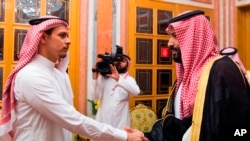The son of slain Washington Post columnist Jamal Khashoggi appeared to acknowledge on Wednesday that financial compensation had been made to the family, but said it did not amount to an admission of guilt by Saudi rulers.
Salah Khashoggi described King Salman and Crown Prince Mohammed bin Salman as “guardians to all Saudis.”
“Acts of generosity and humanity come from the high moral grounds they possess, not admission of guilt or scandal,” he said in a statement posted to Twitter. “We, Jamal Khashoggi’s family, were brought up by our parents to thank acts of good not disavow.”
On April 1, the Washington Post reported the writer’s children were given million-dollar homes and monthly payments of at least $10,000 in the aftermath of Khashoggi’s killing by Saudi agents in the Saudi consulate in Istanbul last year.
The Post, quoting current and former Saudi officials as well as people close to the family speaking anonymously, reported the payments were approved by King Salman.
It is not unusual for the king to make so-called “blood money” payments to victims of crimes or accidents in Saudi Arabia. An example of this was the king’s pledge to pay thousands of dollars to victims of a 2015 crane crash in Mecca that killed more than 100 pilgrims and injured nearly 400 people days before the start of the hajj.
The Post reported that Khashoggi’s two sons and two daughters could also receive payouts of tens of millions of dollars each as part of “blood money” negotiations after Saudi Arabia concludes a trial of 11 people charged in connection with the killing, describing the payments as an effort aimed in part at ensuring that the family continues to show restraint in their public statements.
The statement by Salah Khashoggi apparently sought to clarify this, saying: “The trial is taking place and no settlement discussion had been or is discussed.”
“The people who committed and were involved in this crime will all be brought to justice and face punishment,” the elder son’s statement said.
In its report, the Washington Post noted that Salah is the only sibling who intends to continue living in Saudi Arabia and that his desire to remain in Jiddah with his family contributed to the siblings’ deference to the authorities and caution in their public statements.
The Post also reported Salah has been responsible for financial discussions with Saudi authorities, and that it was the crown prince’s younger brother, Khalid bin Salman, who helmed those discussions on the Saudi side.
Prior to his killing, Khashoggi had written critically of the crown prince in multiple columns for the Washington Post and had been living in exile for about a year, fearing he would be detained if he returned to Saudi Arabia as part of a wider crackdown on writers, activists and critics.
After offering shifting accounts of what transpired, and under intense international and Turkish pressure, the kingdom eventually settled on the explanation that Khashoggi had been killed by Saudi agents in an operation masterminded by two of the crown prince’s top aides, who have since been removed from their posts.
The kingdom denies the crown prince had any knowledge of the operation. His critics, however, point to U.S. intelligence reports that say an operation like this could not have happened without his knowledge.
President Donald Trump has defended U.S. ties with Saudi Arabia, despite Congressional pressure and a Senate resolution blaming the crown prince for the murder.
The White House said Trump spoke with Prince Mohammed by phone on Tuesday, and that that they “discussed Saudi Arabia’s critical role in ensuring Middle East stability, maintaining maximum pressure against Iran, and the importance of human rights issues.”
The call comes days after activists told The Associated Press that 12 people with ties to women’s rights activists, including two U.S. citizens, were detained last week and have been held incommunicado since.










